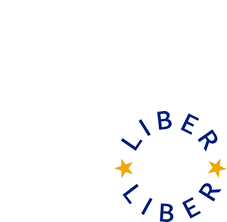4th Digital Curation Workshop
Held at the Staats- und Universitätsbibliothek, Göttingen, 13-14 November 2017
Theme: Data Stewardship and Data Curation
Organised by the LIBER Forum for Digital Cultural Heritage, a LIBER/CERL collaboration. Please contact marian.lefferts@cerl.org if you want to contribute to this event.
Call for Papers
Theme: Data Stewardship and Data Curation This theme is on the agenda of both libraries and research teams and a focus area in LIBER’s new Strategic Plan. It covers a broad variety of aspects. For this workshop three themes have been identified to compare and evaluate experiences in this emerging and rapidly evolving field in order to distil best practices, guidelines and identify areas of future concern
We are planning to organise three sessions that each combine a paper introducing the topic, a short presenting successes (or failures), and a workshop. The themes for the three sessions are:
- Researcher in Residence programmes
- Re-integrating newly-created knowledge coming out of research projects back into the library
- What is required of a librarian (or a library team) that is tasked with data stewardship activities?
For each block we invite you to either propose
a) paper introducing the topic and setting the scene (ca. 30 min), or
b) a presentation demonstrating your successes or failures in this area (10 min), or
c) a workshop allowing practical audience participation (ca. 90 min).
Topic I
Researcher in Residence programmes
More and more library institutions run researcher-in-residence programs, working with digital humanities researchers to develop innovative research methods, tackling a library’s digital content in close collaboration with their data experts. Participating in this program is deemed mutually beneficial to both the researcher and the library and the programme may lead to the development of new, often freely-available tools of benefit to the community at large. Tell us about your programme, so that we can examine the similarities and differences between such programs, list the aspects which need to be considered in such a scenario and map positive and maybe also negative experiences with such collaborations, and determine where improvements can be made.
Topic II
Funnelling research knowledge back into library
Traditionally library catalogues are considered as tools for finding and locating “research” resources in either physical or digital format. However, library descriptions or catalogue entries, especially those regarding rare books or other special collections, have also become humanities research data to be expanded, mined, and connected to other datasets. This is even more true as more and more digital copies of the originals are available – allowing for location-independent access and further image-based description.
In the process, researchers create both new data and generate new knowledge. Increasingly, neither data nor knowledge are automatically acquired for inclusion in library-curated collections (as was the case with a printed monograph or an article in a periodical). How do we ensure that our library benefits from the state of the art in current research?
Databases resulting from research (projects) come with sustainability issues, and issues around data formats, and data models that are not easily compatible with the technical environment in which a library operates. Newly created knowledge is increasingly published in new forms, such as electronic and/or enhanced publications, micro-publications, annotations, etc. How do we deal with the technical issues, now that newly-created data and knowledge presents us with data that is not easily captured in existing library data platforms? Does the library community need to develop, support or take part in a new service?
Topic III
Data stewardship and your library staff
‘Data stewardship’ is one of the new buzz words on the research scene, but a precise definition of what these data stewards will do or what skills they will have is yet to emerge. To what extent does the conceptual field of data stewardship overlap with traditional or emerging practices in libraries, and to what extent does it seem likely to threaten current good practice and/or drive resource use going forward? How do we arrive at a shared understanding of what is required? What might be a feasible division of labour between researchers, IT professionals and libraries? And within that context, what will be the roles of digital data curators, stewards, archivists and rare books librarians in these new areas of work? Share your views with us, tell what skills you are building up in your team, and what you think falls within or outside the remit of a data steward.
Previous Digital Curation Workshops
This is the fourth in a series of Digital Curation Workshops, which previously took place in 2009, 2012, and 2014. The title of the first Digital Curation Workshop was ‘Curating research: e-merging new roles and responsibilities in the European landscape’, and focused on the creation and curation of research data in fit-for-purpose data repositories. The second Workshop carried the title ‘Partnering for digital curation ‘ and talked about research libraries and digital assets, not from a technical perspective, but rather an organisational one. The workshop looked at partnerships, e.g. between custodian organisations sharing the burden of curation (e.g., KB e-depot, Portico, LOCKSS, CLOCKSS), and also partnerships within the information chain (between creators and custodians of digital information). The third Workshop (see also http://libereurope.eu/strategy/previous/2013-2017/digitalculturalheritageforum/) focussed on data management plans and explored the question ‘Which representation of the records will be the target of preservation?’ This fourth Workshop aims to explore aspects related to the collaboration between library and research community, when they are dealing with data which originated in the one community but is of prime interest to the other.
